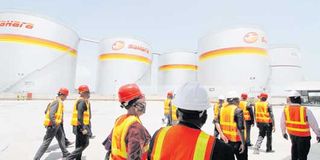Diesel consumption down as companies shift to gas

Guests are taken round new Sahara Tanzania oil storage facilities with a capacity of 36 million litres at Kigamboni in Dar es Salaam recently. PHOTO| EMMANUEL HERMAN
What you need to know:
Diesel consumption decreased by 1.9 per cent in the first 11 months of 2017 compared with that in a similar period the previous year, according to data from the Petroleum Bulk Procurement Agency (PBPA).
Dar es Salaam. Diesel consumption is falling while that of petrol, kerosene and aviation fuel is increasing.
Diesel consumption decreased by 1.9 per cent in the first 11 months of 2017 compared with that in a similar period the previous year, according to data from the Petroleum Bulk Procurement Agency (PBPA).
The average monthly diesel consumption was 148 million litres in 2017, down from 151 million litres the previous year, PBPA cited Energy and Water Utility Regulatory Authority reports.
That happened despite the fact that diesel imports climbed to 1.1 million tonnes from 935,092.37 tonnes.
PBPA acting supply manager Raymond Lusekelo hinted that some companies shifted to use of natural gas.
He also attributed the trend to the government’s control of localisation of petroleum products which were meant for transit.
‘’The move by the Tanzania Revenue Authority to adopt the technology that can track the cargo and reduce the risk of being diverted while in transit as it used to be in those old days might also have been one but not limited to the factors behind the decrease in consumption of diesel,’’ noted Mr Lusekelo.
As demand for diesel dwindled, the consumption of petrol and aviation fuel (Jet A1) and kerosene was increasing.
The total local average petrol consumption amounted to 714,949.49 tonnes from 662,690.16 tonnes, with that in transit going down to 637,654.08 tonnes from 657139.43 tonnes.
“Ahead of the end of the year, from September, most people use private vehicles to travel to upcountry hence high demand for petrol. This might be the like hood reason behind the trend,” a source with knowledge of the sector commented in condition of anonymity.
Consumption for aviation fuel and kerosene was 1.8 per cent higher to notch 21.6 million litres.
Increase in the use of aviation fuel and kerosene despite a decrease in its import both for local and transit to 179,531.93 and 65,104.08 tonnes from 186,993.47 and 72,349.5 tonnes respectively might be fuelled by a rise in the number of airlines in 2017 compared with the previous year.
In January the Tanzania Civil Aviation Authority licensed 10 airlines, bringing the total number to 63 from 53 during the period.
Mr Lusekelo believes that with the increasing number of operators with storage facilities to 23 more businesses will be attracted at the Dar es Salaam Port.
He was speaking during the inauguration of Sahara Group storage facility of 36 million litres recently.
According to Mr Lusekelo, out of 40 operators only 23 players have their own storage facilities with a total capacity of 1 billion litres.
The top three leading company in terms of storage capacity is Tiper, GBP Tanzania and Gapco Tanzania, with 211.4 million litres, 122.5 million litres and 101.3 million litres respectively.
As of December 15, Tanzania had a total of 198.6 million litres and 333.9 million litres of petrol (total of local and transit) and diesel against the storage capacity of 288.7 million litres and 627.9 million litres.
It had 32.1 million litres and 6.9 million litres of aviation fuel and kerosene against the storage capacity of 72.8 million litres and 27.2 million respectively.
“The entry of Sahara Tanzania Limited into the oil and gas sector in the country is commendable indeed as it has come at a period when the administration of President John Magufuli is spearheading a drive to bring about significant investment in the sector,” noted Mr Lusekelo.
According to Sahara Tanzania Limited terminal manager Taofik Lawal “We bring smart solutions to energy needs by deploying the best possible technology as well as distribution and storage facilities that are world-class. Our operations are guided by best international practices and we are passionate about total quality management and excellent service delivery.”




